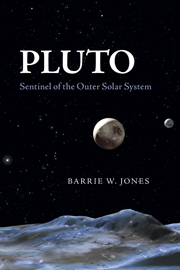Book contents
- Frontmatter
- Contents
- List of tables
- Preface
- Acknowledgements
- 1 The Solar System
- 2 The discovery of Uranus, Neptune and Pluto
- 3 Pluto: a diminishing world
- 4 Pluto's family
- 5 Surfaces, atmospheres and interiors of Pluto and Charon
- 6 The Edgeworth-Kuiper belt
- 7 Is Pluto a planet?
- 8 The New Horizons mission to Pluto (and beyond)
- 9 Pluto: gateway to beyond?
- Glossary
- Further reading and other resources
- Index
7 - Is Pluto a planet?
Published online by Cambridge University Press: 05 December 2011
- Frontmatter
- Contents
- List of tables
- Preface
- Acknowledgements
- 1 The Solar System
- 2 The discovery of Uranus, Neptune and Pluto
- 3 Pluto: a diminishing world
- 4 Pluto's family
- 5 Surfaces, atmospheres and interiors of Pluto and Charon
- 6 The Edgeworth-Kuiper belt
- 7 Is Pluto a planet?
- 8 The New Horizons mission to Pluto (and beyond)
- 9 Pluto: gateway to beyond?
- Glossary
- Further reading and other resources
- Index
Summary
What an extraordinary question! Mercury, Venus, the Earth, Mars, Jupiter, Saturn, Uranus and Neptune are planets, so why not Pluto? Pluto's planetary status had been questioned by some astronomers from not long after its discovery, on the basis of its small mass and eccentric, inclined orbit. But the crunch came in 2006. It was in that year that, after much debate and several votes, the International Astronomical Union, at its triennial General Assembly in Prague in August, which I attended, classified Pluto as a dwarf planet. This short chapter is devoted to Pluto's classification, which is an ongoing issue. But first let's consider the wider issue of the role of classification in science.
THE ROLE OF CLASSIFICATION IN SCIENCE
In science, classification provides an economy of description, a tool for structuring knowledge, and can also lead to deeper understanding.
A simple example is provided by crystals. All crystals share two attributes that define the class:
the basic unit, be it an atom or a molecule, is arranged in one of a variety of repeating patterns in space
they are solids, i.e. they retain their external form and do not flow like liquids.
The economy of description is that, in place of saying ‘one form of water ice is a solid with its component molecules arranged in a repeating pattern in space’, one just says ‘crystalline water’.
- Type
- Chapter
- Information
- PlutoSentinel of the Outer Solar System, pp. 169 - 182Publisher: Cambridge University PressPrint publication year: 2010



